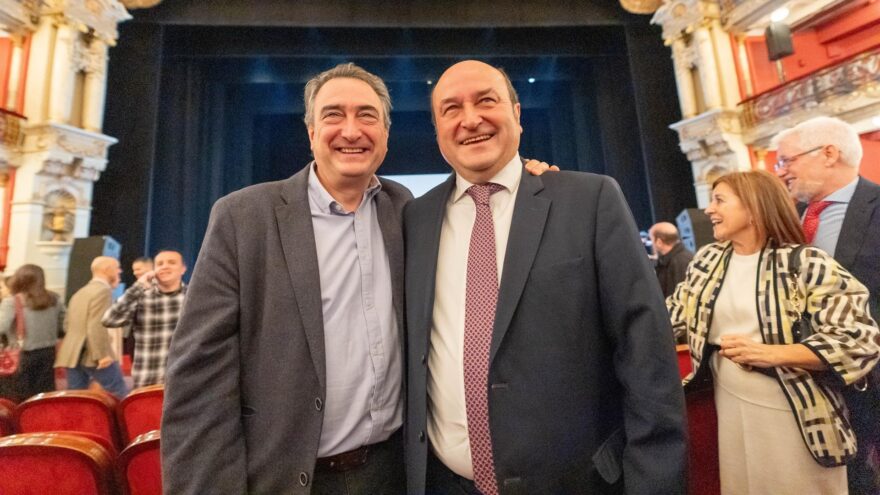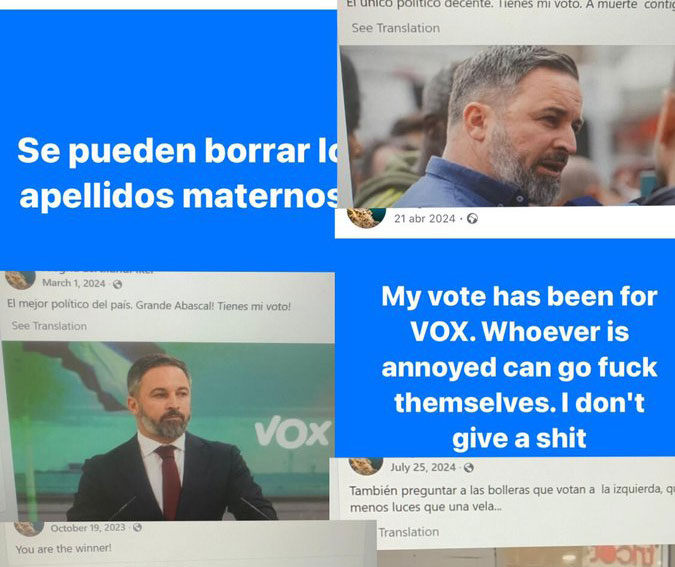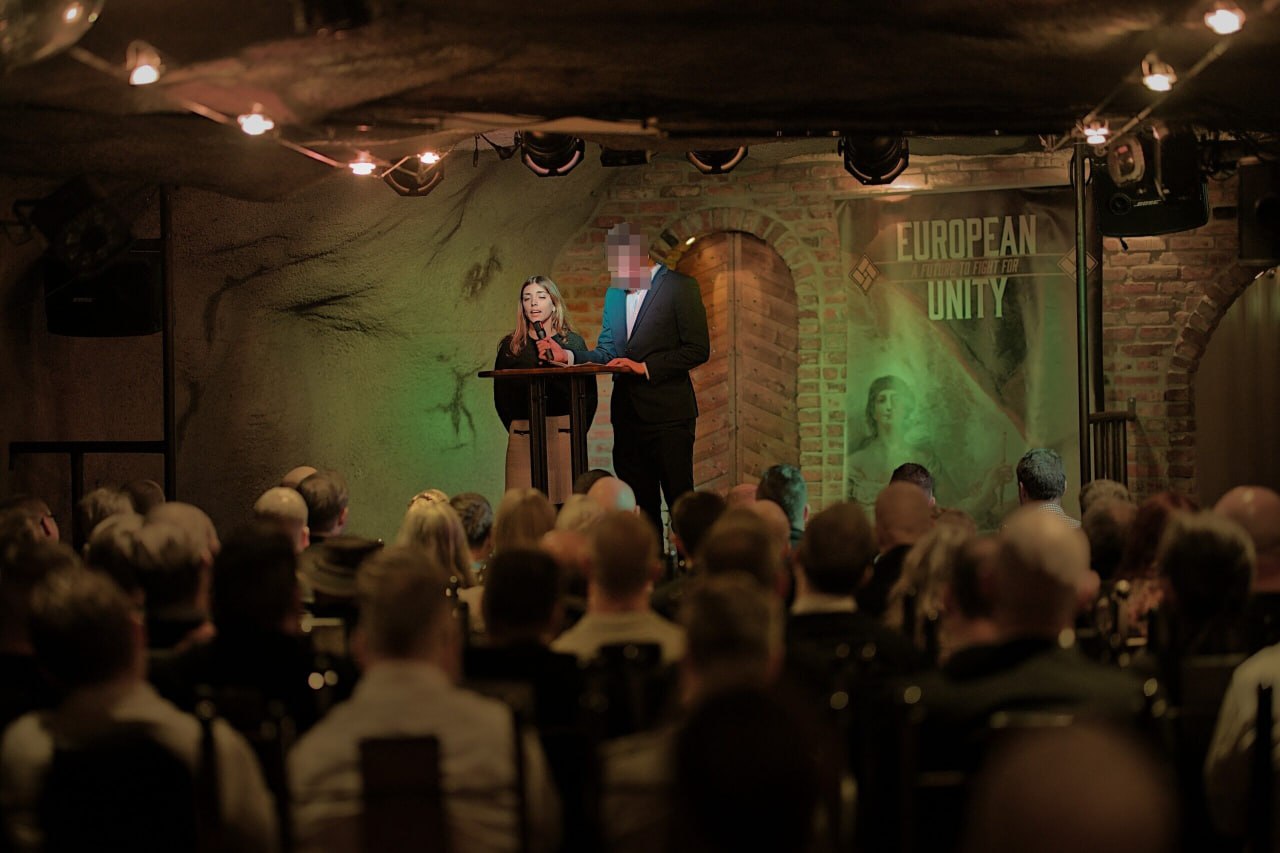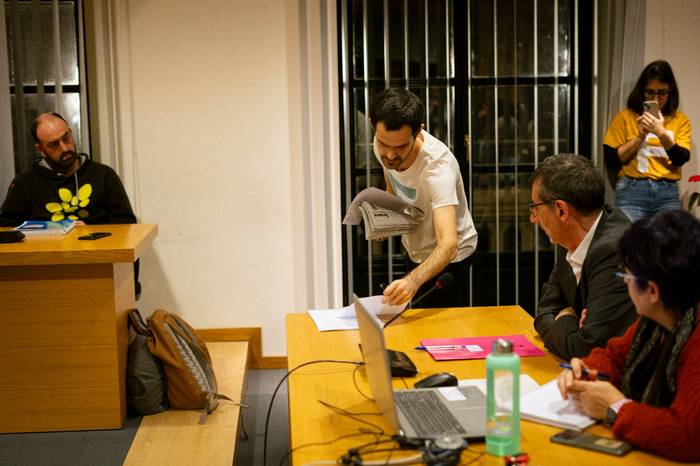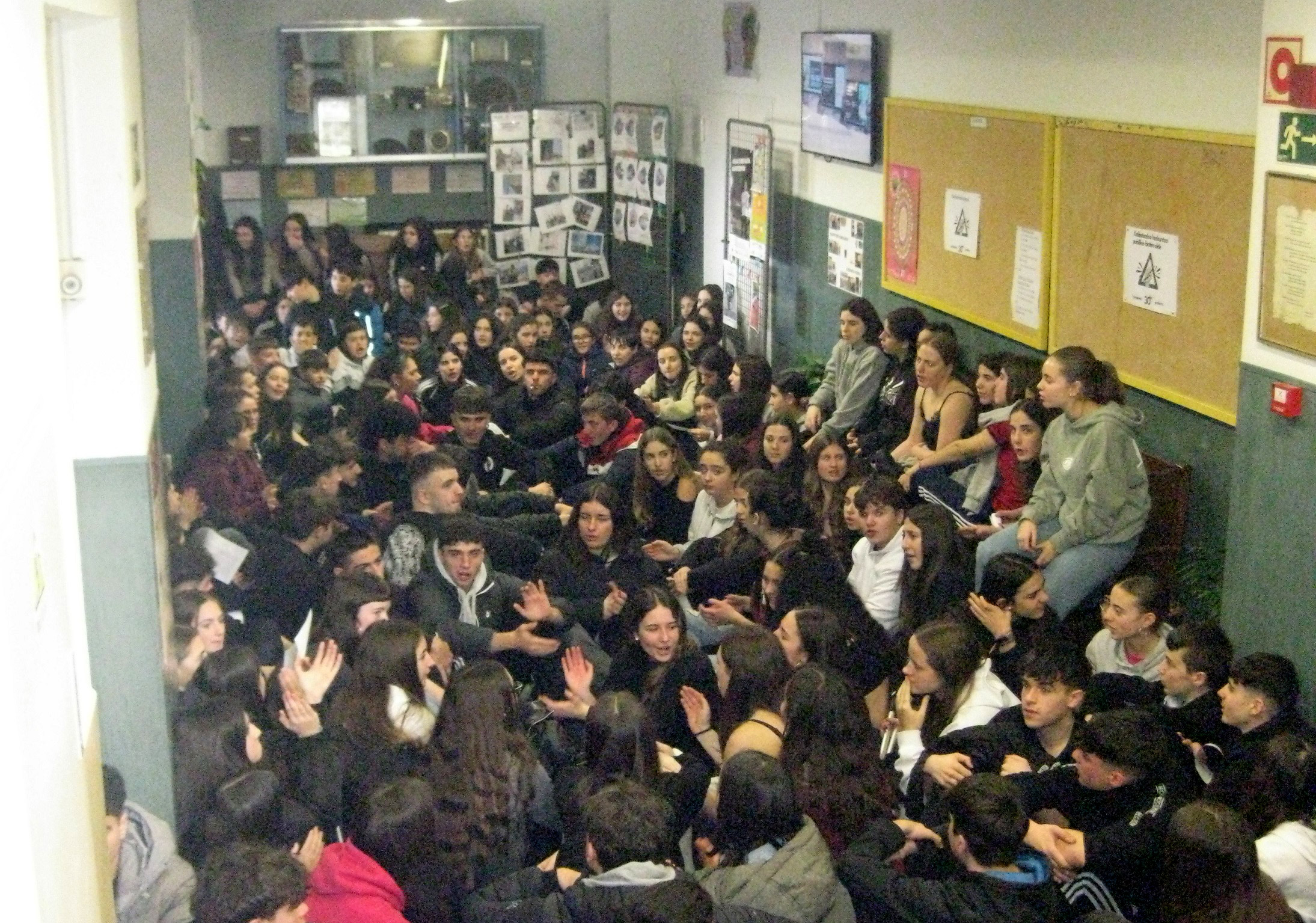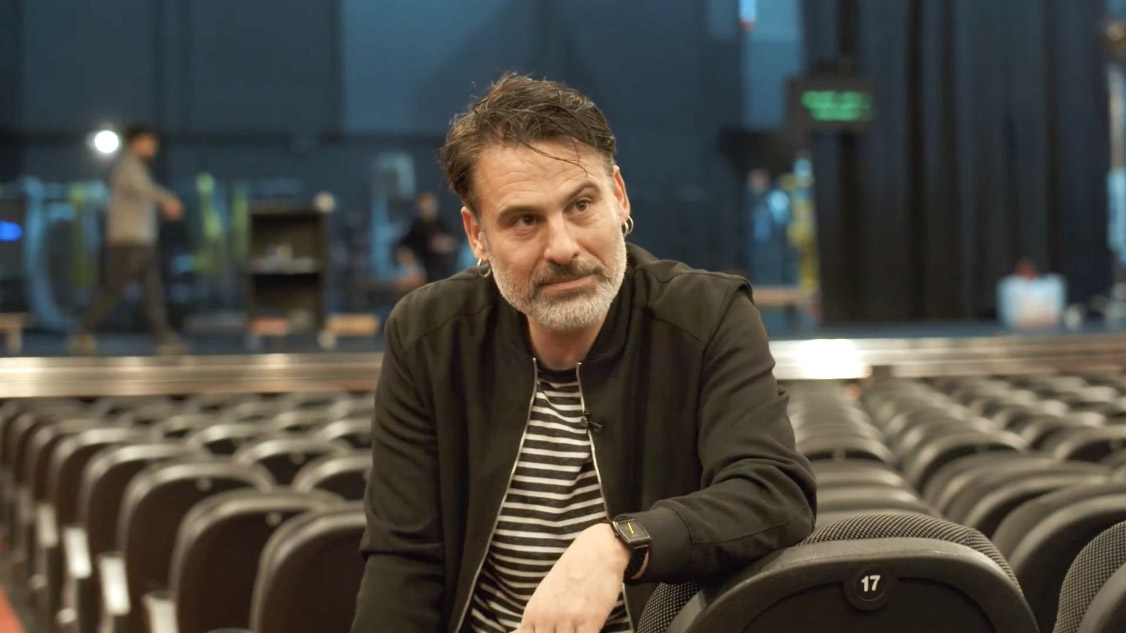"Our society is the enemy of pleasure"
- Have you ever held the baby you once held in your arms?
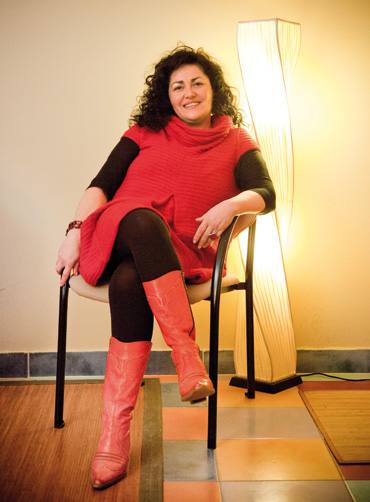
Many psychologists study the childhood of their clients to untie the knots of their present. How was yours?
We all become people in a certain family context, in a family style. The first thing that marks us is the family style, and my family is hardworking, intellectual and very committed. That marked me first. I regret one thing very much: I read Marx when I was 14, and you don't have to do that. The political situation also had a huge impact on me: Franco’s repression in all areas, not only ideological repression, was influenced by violent repression in the philosophy of life. Those of us who were born into anti-Francoist families were very influenced by Francoism: we started to work in different groups very early, which had its advantages and disadvantages in us. We were taught a lot by those struggles, but we lost our freshness. The leniency also marked us a lot, in my case, the unofficial leniency. The church in Deusto was very committed and that gave us another perspective on life. I was also very influenced by the beginning of the discourse of feminism, a passion for the study of sexology that arose when I discovered feminism. We were very liberal, the transgression, the insubordination, the relations between boys and girls were our generation... The transgression and the passion for freedom in our squad were daily bread, it was not a reflection in society, it was a ghetto, but that ghetto affected me a lot, for the good. The relationships between us, between boys and girls, were very special, very open. We also studied at an experimental institute. It was a new experience that arose after the death of Juxtu Franco: we studied without books, all the teachers were very young, from 23 to 24, and all from the Communist Party, the LKI... I am very proud of my adolescence: I was very hippie... And I think that all these factors that were given shaped me a lot as a person.
How did you decide to study psychology?
When I was very young, I began to say that I had to study psychology. I was very repied. I had two careers in mind, actually: law, to be a labor lawyer, of course, and psychology. But these two careers, if they stayed in Deusto, had to be studied with the Jesuits, which was not in accordance with my philosophy of life. Besides, when I saw those fat law books, I decided it wasn't mine. I've never been a bookkeeper. I have been more in favor of living experiences, and the balance has deteriorated in favor of psychology. In addition, it was at this time that the University of San Sebastián Zoraga was born. It was also an experiment: there were also young teachers, some from Paris, others from Salamanca... I used to go at night because I worked in the morning. It was a very interesting experience, the teachers were passionate about teaching and we learned a lot. We were few people, we learned everything through seminars and seminars. And the political struggle was also very present in the university.
When did you start studying sexology?
before the end of the race. I had a passion for sexuality from a young age. When we were in the experimental institute, Efigenio Amezua, the father of sexology in the Spanish state, who was imprisoned for talking about Franco’s garain sexology, was brought to give a lecture to the institute. He totally conquered me. And I started doing several courses on weekends in this direction during the University.
You have often mentioned that sexual repression was explicit in your childhood, and that this supposed freedom now is even more dangerous.
We were told in our day: “masturbation is bad”, “masturbation is a sin”, “girls do not masturbate”, “virginity is a very important value”, “girls do not show genitalia”... The messages were very direct and therefore those who wanted to transgress transgress transgress directly, there were no hidden gaps. What is happening today? Now, in theory, everything is possible, it seems that we live in sexual freedom and that girls can masturbate, walk naked... Today, the paths of repression have changed. For example, many children repress themselves on the path of exigency. They are told: “girls are multiorgasmic”, and if their girlfriends don’t have 5 orgasms they feel guilty, frustrated and repressed in their desire. Repression is the use of certain information against emotions. In the case of girls, on the other hand, think of a girl at school with her legs open with skirts and leotards. Nowadays it’s not said “you can’t show your genitals”, it’s called “sit well”. We don't seem to repress it, but it's the same thing! Hidden, but the same repression. A very bitter repression. It is a lie that the message we give today is “you can enjoy”. Today’s sexual myths are just as repressive as before and, from my point of view, worse because they are hidden and take us far away from who we really are, from our true desire. If I have to have 5 orgasms in a row because I'm a girl... that takes me away a lot from myself. Repression is not just a negation; any action against emotions could be repressive. Today’s repression is even more cruel than the first, and it can be felt by young people. The only thing that has changed is the age and frequency with which sexual intercourse is lived, but the internal problems remain. We do not educate children and young people to develop their sexuality from their emotions. It is very difficult for us to live in pleasure.
You were one of the first to speak Basque about sexology in the Basque Country. What reception did you have?
Until then, I was talking about sexuality in the middle world in Bilbao and Bizkaia, but later I have been working in Gipuzkoa and the Basque area of Navarre, in small towns. It was a revolution to start talking about sexology. I was young, and that gave me courage and unconsciousness, and gratitude. In the first few years the listeners expressed their disagreement with me, they told me that I was pushing young people to unhealthy practices with that speech, the adults felt very invaded... The most fun experience was that of Radio Euskadi, I was about twenty-eight years old when for the first time Arantxa Iturbe and Jaime Otamendi interviewed me on Radio Euskadi. I went to talk about penis, orgasm, clitoris, pleasure and body and those words, in Basque, exploded in my ears. However, Arantxa and Jaime offered me to collaborate with them weekly and I accepted. Besides, we did it in the morning, imagine. We set the phone on fire: people called us angry, how could we do that show with public money? Then I went to the night, and the night audience was more tolerant, but the morning listeners were women and retirees, and they couldn't stand it.
Did they take you seriously?
There was a lot of morbid, but I've always given sexology a scientific perspective. This is a subject that always gives for frivolity and morality, but I have always given up interventions of this tone. I’ve never been to a media outlet to talk about this topic except from a health or scientific perspective. I asked questions beforehand, otherwise I wouldn't give interviews. In many places I wasn’t taken seriously, and this was directly influenced by the fact that I was a woman and a young man. If I was an adult male who talked about the penis, I probably would have had more authority. I knew I'd have to gain authority. No frivolous word about sexuality has come out of my mouth, and I know that this is often not to my liking, because speaking from this perspective makes a lot of social criticism, but that was my goal. But in the same way, there was a lot of interest in society and I felt very protected by those who hired me, although for too many years I have felt quite alone in my work. But I’m happy, it was an incredibly good radio experience, I also worked with Dani Arizala for many years in the Basque Country and I think we managed to spread some speeches in society, which is a great thing.
Today you combine sex education with the work of psycho-therapist, but you start from the same starting point in both works: from the emotions generated by experiences.
That's the way it is. When a client comes, if you only respond with the body theory, you won't get anything. I was very respectful of starting psychotherapy, I found the big words crazy and I formed a lot before I started. But when the first client left the office (whose last names I still remember) I said to myself: Amaia, you have no clue, I don't know why you've learned so much. Later I realized that, in professional practice, books are important, they give us security and a theoretical body, but since we are working with emotions, the most important thing is not to know much, but to know how you build a face-to-face relationship with the client. This has been the most difficult topic in my career, which motivates me a lot today, because every client is a challenge. It is the work that will be based on the relationship between us that will produce results. I am a woman of great intuition, my colleagues and those who have shaped me tell me and I move well in emotions, which has helped me a lot in my work. After all, talking about depression, talking about sexuality, talking about the needs of children... is talking about emotions. How does our nature manage emotions? That's the question. We are born programmed to be happy, to be well and to be in pleasure, but unfortunately, due to a thousand other variables that occur in life, it is often not possible to stay in this state. So the only thing we have to do is recover what biology gives us. Our work is as simple and complex as that. I know that everyone has the ability to live happily, calmly, and joyfully. But this presupposes work: work, to question the values we have received, to question certain ways of functioning that our family has imposed on us... How to manage everything we learned to be true to ourselves? To attend to our desire? That’s our question: what do you want? And the response must be a tripet, an emotional response. What the mind responds to is often anti-emotional.
When you talk about child prevention, what are you talking about?
I was a very young aunt, at the age of 11, and I was taking my nephew to school. When I took her to the bus, she cried, and I felt terrible. I held her hand tightly and thought: if I ever have children, I’ll never send her to school crying. And I kept my word. But apart from my nephews, I had no contact with children. It was a university professor who opened my eyes: the key is in the child, I realized. The key is in childhood. We are marked by childhood. In our day, it was believed that the children did not realize anything and did not need anything. The opposite is true: the child knows everything and needs everything. It was a tremendous discovery. Do not forget that at that time we were taking women out into the public sphere, the family structure was changing and the emotional needs of the children had to be hidden so that the women did not feel guilty. We had to take them to the nursery, we could not hold them in our arms because they got used to it badly, when they cried (if it wasn’t for hunger or to change their parks) they should not be ignored... This philosophy was spread, these messages were sent to us. Women were putting pregnancy and childbirth in the hands of gynecologists, technology, there was no need to breastfeed... They sold that to us, but when I first read Freud and then Wilhem Reich I learned what a child was, what was at stake in childhood. I have always been a very anarchic way of doing therapy, but reading them I realized that we are born healthy, we later move away from joy and pleasure. A child is emotion and sexuality, eroticism, and if we do not infect all this, the child will grow up healthy. It is in childhood that the foundation of a person is established, what it will be like, its strengths and weaknesses, everything is consolidated in childhood. We can't think they don't need anything.
So happiness is an exercise in unlearning?
Yes, unfortunately, yes. In reality, the natural state, what the biology marks us is to be well, to be calm and happy, but we have to recover, because we lose along the way. And, in fact, this is the job of psychologists: to deprogram, to deprogram what we have learned badly or what does not make us happy.
You have met many people, cases and experiences, what would you say are the main blockades today? What are the consequences?
People under the age of 40 have suffered the most severe consequences of social change. We work mainly with the fear of being left alone or abandoned today. This fear is inherent in childhood but, unfortunately, many have actually lived the experience of abandonment, which marks us tremendously, conditioning the way in which we will build relationships later. We see the greatest difficulties in relationships: all dependencies come from there. I'd say we've been emotionally abandoned, some more and all the others less. I think that they have done little to us, they have done little to us, they have cognitively demanded a lot for the benefit of pseudo-autonomy, and we have not been able to respond to this situation, because the child must be allowed to live the dependence if he will later be autonomous. If you don’t let the dependency live, it will be chained to that need. But, of course, letting the dependency live means having the baby hanging for the first seven years, first with the mother, then with the father and then with the people around. We want children to be independent immediately. At 4 months we take them to the nursery. And kindergartens are necessary, but not with the philosophy we have today! Nurseries were one of the most important claims of the 70s, but how do we use them? We leave many children at 7:30 in the nursery, where they spend seven and a half hours, with few affective references for many children. Socializing for a child is like going to war in the first few years, they feel very alone. In the social structure that we have, the child is the last. It should be the first, but it's the last. We are passionate advocates of childhood, things are going wrong, childhood diseases are increasing: asthma, bronchiolitis, angina, hyperactivity... Hyperactivity: here’s another diagnosis that modernity has created to hide what really happens. We say, since hyperactivity is a dopamine problem, give dopamine and you're done. But we don’t go any further, we don’t question what the child really needs. It's hyperactive, okay. He's upset, all right. And how do we keep it? How do we keep it? With the dopamine? Or with my body? Psychologists, teachers and parents know that, at least when they apply common sense, the body heals. I have proven this for many years.
Do you also work in schools in this direction?
Adherence is also what I study when I go to school to inspect cases. And I often say to them, do you know what your child should do? Just hold him in your arms. You have to rock it again, wrap it up like when it was little, protect it. Every time he asks you to take him in your arms, take him. And the sickness disappears. Finland, Norway, Sweden... many years ago they realized this. They found that they were spending more money on psychiatric medicine than on childcare and parental care, and decided to change their approach. They adapted the work system, nurseries according to the schedule of the children, they provided support to the parents, in nurseries it is a reference for three to four children... What I am saying now is not invented by us, it is common sense, which has been verified a thousand times in different places and times. But what's going on? That goes against the labor system and the capitalist-producing system. Because this system is anti-human. In the end, what did we do? We have developed nurseries and technologies so that women can also live as men within the same production system. And I am a supporter of the discourse of difference: I am not like a man, and not all men are equal. Why do we all have to fit into the same model if this model also makes us sick? But women still go out into society with the values set by the patriarchy, and our children go out as losers. If I want to be a mother and stay in touch with my child, why does society not allow me to do so? It is proven that children with strong adherence use much less health services.
So what is the conclusion that no society composed of healthy and happy people is suitable for the system?
That's my question. I can't find another answer. This discourse is very marginal, although it is spreading, but if we do not guarantee an infrastructure that allows us to carry out these reasonings, the only thing that we achieve is to make parents feel guilty. Although they want to educate their children in a certain way during their daily marches, because the system does not leave them any gaps. We're talking about repression again, postmodern repression. Although we realize the harm we do to children, we continue to operate forever. How could that be? Nowadays, to be able to practice this type of growth you need to become a completely alternative, and it is a paradox because the alternative is the most natural. And I don’t want to live in a ghetto because I proclaim this kind of growth, I don’t understand the commitment to this kind of growth from hippismo, but we still don’t put resources to make what we proclaim, within “normality”, viable.
You've been working in sex education for twenty-five years. How has society changed since then?
The sexuality of the first children did not exist. It seemed that sexuality was something that awakened in adolescence. When you talk to parents and teachers today about children’s sexuality, they know what you’re talking about. It is increasingly respected, although subtle repression continues to have a major impact. Today, teachers are trained on this topic, how to act, how to work on the topic... In early childhood education it is not a taboo subject, it is observed by parents, and our job is to help position sexuality in the barracks of child development. Again, we talk to teachers about the importance of student emotions. Students’ cognitive processes have a lot to do with the emotions they experience, and teachers are gradually realizing that it is not so important how much you teach, but how you teach. The most important thing is the affective relationship or attachment of the teachers to the students. It is difficult to include this discourse, especially from the Primary. Leaving childhood behind, teachers forget about emotions. The demands of society become the most important: to teach mathematics well, to start preparing for the world of work... How can there be more and more school failures? When we look at the relationship between students and teachers at ESO, we often find enormous abysses. I believe that we are all aware of the logic of this discourse, but the application of this philosophy requires a pause and dedicating time to the encysted cases, and it is this juxtu that we do not have in this society: time. Even when clients come to my office, one of the first questions is “how long will it take?” Freud called his clients “patients” for a reason, deprogramming takes time and patience. But time that is not economically productive seems to us a waste of time. If the child asks, “What did you learn today?” and says, “No, I’ve been playing with the lady today and she’s told me a secret,” we don’t think it’s productive. More and more individuals – parents, teachers... – are aware of this, but the structure has not yet changed.
Society's image of psychologists has changed.
Yeah, the first psychologists and psychiatrists were supposed to treat crazy people. The initial customers told me, “I’m not crazy.” Emotional knots did not exist, they were not given importance. I don’t think we need psychologists for everything, we need to be autonomous, but today people think that psychologists can help us. It is true that there was a time when people came to know themselves, today this does not happen, today it comes because people feel bad. But I think they feel us closer. However, there are still many psychologists who don’t have plates outside, as clients are embarrassed. It is true that in our work, as in all works, there is a lot of intrusiveness, and I always say that you can not go to any psychologist.
But how to distinguish a good therapist from a bad one?
If you take your children away, it is true that there is an act of faith to a large extent. If you are going, however, you must start from what you felt during the first or second session. You may be the best therapist, but if the relationship doesn’t work you can’t work, that’s why even psychologists sometimes have to tell some clients “I can’t take you.” We do not accept all customers. Cognitive behavioral psychologists don’t have such problems, they don’t start from emotions, they transform behaviors and that’s it. But in our case, if the relationship, the attachment doesn’t work, we can’t work.
With the change of society, emotional blockades, crises, etc. change. Even the one?
The basic blockades are always similar: they are based on fear, sadness and the problems created by them. What changes is the name that society gives to these problems. The first hyperactivity did not exist, there were children who were moved, who did not focus, who failed. They're hyperactive now. Or the sad old kids are the depressed kids of today. The change in society and, above all, the change in the family has brought the greatest difficulties: the old family model has been disstructured and I do not believe that we have yet formulated a new family concept that responds to the emotional needs of the child. We have not yet decided how to divide the tasks within the family, for example, and if the couple is discussing the separation of the houseworks, they are not able to worry about the needs of the child. Before it was clear what the distribution was, now everything is relative and many couples live in combat. Women and men are still struggling and therefore we are not focused on the needs of the child, we are focused on our individual feelings. And that has a high cost. We need to bring children into safe and stable environments. And it is true that many women still feel very alone in raising children. Housework, parenting, education and care are still mostly in the hands of women.
Why Is Rock The Most Erotic Age Of Life?
In childhood the body is always present: body, contact, gaze, pleasure... And they say: “How beautiful you are”, “how much I love you”, “Mom, come”, “Dad, come”... It’s beautiful how they flirt with each other, how they show each other their butts without any morals... Body, pleasure and curiosity are always present. If you look at a child and it’s healthy, it’s magic: how it comes to you and how it gets into your arms, how it smells... That's what sexuality is: an aroma, a fereca, a look... If we give pleasure to children through contact, they will not fear pleasure later.
In general, do you think we live in a society that is afraid of pleasure?
That’s the core of my philosophy. I heard a teacher in Valencia who was training in Wilhem Reich’s therapy and doing my own personal therapy: “People in this society are afraid of pleasure.” That word has stayed with me forever. At first I didn’t fill it with content, but when I started working I realized it was true. We have been educated in masochism. Before it was clear, the Catholic leniency was an apology of suffering and sacrifice, but in modern society we are sold that everything is pleasure, everything is freedom, leisure, and “here and now.” And it's a lie. The pleasure they sell us has to do with euphoria, the other side of depression. Euphoria is an emotional escape. Is the boteilon a pleasure? 15 cereals and three lines of cocaine are pleasure? Is the excitement of a football match a pleasure? That's not a pleasure. In modern society, the concept of pleasure is undefined. They sell us that pleasure is to flee from everyday life, that it is an escape, when it should be the other way around: we should be in pleasure. When I started to work, I realized that when many customers started to feel the benefit as they progressed, when they came out of turmoil and turmoil, when they started to feel good... one by one, they had a tremendous setback. As they approached pleasure, frightened, the customers retreated. They couldn't stand being well. It seems like saying we're afraid of pleasure is crazy, but it is. We tend to go back to the lack of pleasure, to the anxiety, to the struggle, because that’s where we’ve been educated, we have it recorded on the hard disk. We offer only small margins to pleasure. When do people get sick? During the holidays. When do fears arise? During the holidays. As we approach pleasure. In fact, the system is very well organized so that we don't feel anything. We should move from “I think so I am” to “I feel so I am” in Descartes. But they don’t let us feel, that’s what the machine is based on, the negation of feelings. If you take some time and start to feel it, it's over, you're full of shit, you better get back to work. Our society is the enemy of pleasure.
What does mastrubation offer to children?
Something very important: self-esteem. And pleasure, of course. But self-esteem is a psychic construction, and when children are young we feed them through contact by their parents. What does a child need? Contact, body, taking her in your arms when she cries, protecting her when she is afraid, sleeping with us, breastfeeding, not letting her be alone, letting her be angry... At some point, the children develop a self-image and begin to develop the “I.” At that moment the sexual energy descends from the mouth to the genital organs, and they discover their body. Imagine what a gift to your self-esteem is to realize that you have a body that gives you pleasure. This gives them tremendous certainty. Of course, there are also sex hormones, and children are constantly filling and emptying them. They constantly repeat the function of orgasm through various mechanisms. That’s why I always tell my parents the same thing: when we had a repressive model in our time, I masturbated. Now it seems to be normalized, but silence is the answer: is he masturbating?, well, I will look the other way. The next step is the model of pleasure or health: we must positively reinforce the act of masturbation, saying “how beautiful, how much fun you are having, right?”. For children it is very important what we feel and think, and if we tell them “what a beautiful body you have, how much fun you have with it!”... These phrases are our next challenge. But to educate a child in this way, we have to work a lot with ourselves, because the child will expose us to all our taboos and repressions.
What is the sexual desire of children?
Like adults, but, if allowed, without repression. The child goes to the mother or to the father and stands on him, kisses him with his tongue, touches him... Same with their elders. The only thing we have to teach them is the concept of respect. Everything in relationships and sex is possible as long as you are not acting against the desire of the other. That's the only thing we have to show them. And we have to tell them, “Yes, you like Jon very much, but Jon doesn’t want to play with you.” But, of course, we will stay by the child's side and share his pain. We must show solidarity in our emotions, not deny them. We tend to deny emotions that we don’t like, and all emotions are necessary.
It seems that we don’t give much importance to children’s emotions, such as in love.
I take this very seriously and say to my parents, like a professor, that when their son or their fatality tells them at the age of 5-6, “I’m Michael’s girlfriend,” they have to celebrate. Because she has just done something very difficult and important: she has chosen the one she likes the most! He's made a free choice out of emotions, which is a big deal, because we don't educate them for that. In life, autonomy is knowing how to choose. So we have to let them make the choices that need to be made at every age and respect their choices. And just like in adolescence, we should celebrate with champagne. In addition, if they are in love during their adolescence, they tend to be much more genuine and take more care of themselves. Love is prevention, because you won’t have to fill the emotional gaps.
“We have created the first children in the history of the world who have been born with the need for a psychologist” sings Mikel Markez.
I fully agree, I would prefer that children do not really need so much, and that is what I work for in prevention and health. I suffer when I see children suffer.
However, the myth of “happy childhood” still has a lot of strength.
That’s a myth, the idea of pure happiness is a lie, children suffer even when they are healthy. Childhood is naturally happy, but also full of conflict. We develop thanks to crises and conflict, but we need company and support in these crises. If we are with the child, these crises will be an opportunity for him. Therefore, the happiness of children is largely in the hands of adults, because it is clear that children will suffer at certain times, but it is up to us to be in solidarity with them in this suffering. When I speak of suffering, I always distinguish between fruitful and destructive suffering. Therefore, we adults must be there, we must accept that children, at times, suffer, and that the suffering that can be constructive if we are not together with them will become destructive. So ours is a work of love. We must help them to move towards autonomy, without abandoning them and without excessive protection. Parents who overprotect children do not allow children to grow and be autonomous.
Some say that all these are problems of the rich, that if we lived worse, we would not have had such problems.
It is clear that the one who struggles to feed has two problems, hunger and perhaps, as we in the first world, depression. That there's more depression here? Yes, but I insist on structural changes. It's not true that if you're hungry, you're going to suffer from depression. You will draw strength to meet this basic need, but the depression will still be there. In traditional society, people saw clearly what did not allow them to be happy, because the structure, although repressive, was clear. But today a lot of people come to me saying “I have everything, I should be happy, but I’m not okay”, they feel guilty because they’re not happy.
What are the main factors or motives that drive people away from happiness?
For starters, the work system. It takes us a lot of time in vain. On the other hand, we don’t know how to stay in touch, we don’t know how to approach people from love, from affectivity. Loneliness, individuality... And the empire of rationality to the detriment of emotions.
Today, 95% of women give birth to an epidural, arguing “why suffer in vain.” Why are you in favor of natural childbirth?
Above all, I focus on the needs of the children. If I bet on deliveries without epidural is not only for the health of women, but for that of the child. That's why I defend natural childbirth, breastfeeding, body contact... When I was a mother, pregnancy and childbirth were placed in the hands of doctors, and women completely lost their leading role. As a feminist, I believe that when women – and men as well – decide to become parents, we must regain our leading role. Just as we must acquire it in the world of work, in the world of sexuality, in relationships, also in pregnancy and childbirth. That’s why I say that I also bet on health and feminism, it’s not just hippismo. At that time, therefore, we began to proclaim that women should return to our protagonism and that parents should also be allowed to live this experience. As soon as the baby was born in the hospitals at that time, the baby was separated from the mother for six hours. 15 years ago we were still like this. They did not respect the natural rhythm of the woman, everyone had to give birth as soon as possible, the number of cesaras increased... In addition, births when women are not in contact with their bodies and interiors are often convective. Fortunately, things have improved a lot in hospitals for a couple of years now. We must defend two things: the woman’s recovery of protagonism and the bond with the child, respect for the affective needs of the mother and child: not to separate the child from the mother as soon as the child is removed, not to bathe the child immediately, not to throw colonies... And naturally promote natural breastfeeding.
You have repeatedly stressed the importance of breastfeeding children.
A few years ago, I read to a midwife who had been working for forty years that it was never said before that the woman did not have milk. There were usually no or very few women who could not breastfeed. Today there are more and more problems with breastfeeding. This makes one thing clear: women have lost their capacity for motherhood. We've lost our fertility. The presence or absence of milk has to do with the way in which motherhood is lived. There are two ways to approach motherhood or fatherhood: from emotion or from social authority. If you do it from the emotion no one will have to tell you that separating the child from you is bad, you will feel it. Here's the key. If we took emotions into account, there would be far fewer women with breastfeeding problems. However, in the face of the problems, there are ways to administer the bottle well. When the child takes the vibeoria I must be seen by the eye of the mother or father, it is important to be able to make the movement of convergence: from the eyes of the mother or father to the tip of his nose, from the tip of his nose to the eyes of the mother or father. This is how the affective bond and security are created, and the child creates a relationship between reality and himself. All other relationships that we will make later will be based on the relationship we establish there.
It is said, however, that technology is developed for the benefit of the independence of parents.
The technology has been developed to separate parents and children as soon as possible, and the sooner you separate them, the more dependent children will become. Children should be allowed to live in dependency and then be autonomous. Children who have been allowed to live in dependency send you to take the wind at the age of 7-8, and with fifteen, no matter what, they are incredibly autonomous. Of course, then we have to accept this, we have to respect their autonomy, it gives vertigo that the child feels that they no longer need us for many things. But that's life. Why do we bring children into the world? For them to live their lives.
Amaia Vazquez Deustun jaio zen 1961eko urriaren 3an, baina Hernanin du bizitokia aspalditik. Psikologo klinikoa eta sexologoa da, eta hainbat arlotan aritzen da lanean: haur eta gaztetxoen prebentzioan eta irakasleen eta gurasoen formakuntzan, psikoterapian... Hernanin du kontsulta, eskolaz eskola eta herriz herri aritzen da hitzaldiak eta formakuntza zikloak ematen eta irrati uhinetan ere ezaguna da bere ahotsa.
“Duela urte batzuk oso gutxi ziren bularra ematerik ez zuten emakumeak. Baita haurdun geratzerik ez zutenak ere. Gero eta gehiago dira arazoak eta horrek gauza bat argi uzten du: emakumeok amatasunerako gaitasuna galdu dugu. Emankortasuna galdu dugu. Emankorra izateak ala ez izateak, esnea izateak edo ez izateak amatasuna bizitzeko moduarekin, horrek sortzen dizkigun emozioekin du zerikusia. Nondik bizi dugu amatasuna? Emozioetatik ala exijentzia sozialetik?”.
Vagina Shadow(iko)
Group: The Mud Flowers.
The actors: Araitz Katarain, Janire Arrizabalaga and Izaro Bilbao.
Directed by: by Iraitz Lizarraga.
When: February 2nd.
In which: In the Usurbil Fire Room.











